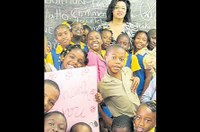The Nurturing Karen Fitz-Ritson
The nurturing Karen Fitz Ritson
ALL WOMAN Monday, August 15, 2011 , By NADINE WILSON All Woman writer
As the director of Fitz Ritson and Associates, the financial analyst has more than enough to occupy her time. Still, most mornings find her with her colleagues preparing a pot of porridge or other common Jamaican breakfast staples for children from dysfunctional or poverty-stricken homes in Kingston.
For the past 12 years, Fitz Ritson has been visiting Majesty Gardens, where she tries to inject love and attention into the community, which has been pegged as among the poorest in the island by the authorities.
At first, she would go along with her church to assist the basic school there, but having been exposed to the destitution which characterised the area, she was compelled to play an even bigger role.
"I made it my project to go down there and see what the needs were; and every year for the past 12 years, we go down there and assist the 90-something children between the ages of three and five," she told All Woman.
The project was a success from the start. While she wasn't able to change the mindset of the young mothers in the community, whose average ages range from 16-19 years old, she was able impact the youngsters positively.
About four years ago, Fitz Ritson decided to broaden the project and approached her colleagues at GraceKennedy, Hylton and Hylton, Stocks and Securities Limited, CUNA Mutual and City of Kingston to get on board. The group added Stony Hill, Mountain View and Waterhouse to those areas they would visit to assist children.
"We decided that we wanted to do more with these students in terms of literacy, because we recognised that many children were leaving the secondary schools and going into tertiary institutions and they were not fully literate," she explained.
"If we were going to correct this problem, then we had to start from the fundamentals. We had to start from the three year-olds to the five year-olds who were just getting into the school system."
The group has been getting a lot of positive feedback from the principals of the various schools they visit, particularly the school in Stony Hill.
"When I went to the principal at the school there, one of his concerns was that for a lot of children, the attendance had fallen and a number of them weren't coming to school because he felt that they didn't have any breakfast to come to school; so I was very incensed about this because if children don't eat, they can't learn," she said.
The breakfast programme benefited both students and staff, as teachers would often come to have an early morning meal and interact with the students at the same time.
But equally important is the literacy project which has been launched in the schools. In addition to donating books, the volunteers usually have designated reading days where students can learn critical reading skills and develop a healthy appetite for literature.
"Last year, we gave 650 books because our focus was mainly on literacy," she said. "Throughout the semester I am buying crayons and colouring books and all kinds of stationery for the children so that these schools never run out, because one of the important things is to develop their creative skills."
Fitz Ritson hopes to nurture a culture of reading in the country, but most importantly, she wants to build self-confidence and civic pride in her 650 young charges.
"We might take certain things for granted, but for some of these children, it's the first colouring book they've ever owned in their lives, it's the first pack of crayons, they have ever owned in their lives," she said.
Given the impact her project is having on young lives, she implored other businesses to come on board and adopt communities in which they can try to make a difference.
"We need to invest in our future, because we are robbing from them now if we don't invest in our future. When we get older, we will not have the opportunity to sleep on our beds, but possibly under our beds, because if we don't nurture these children, we are going to have an angrier society than we do now," she said.


